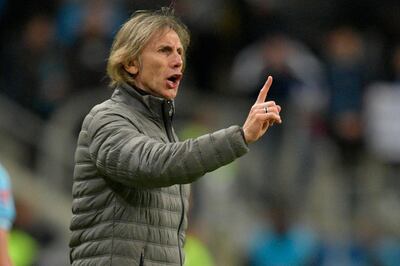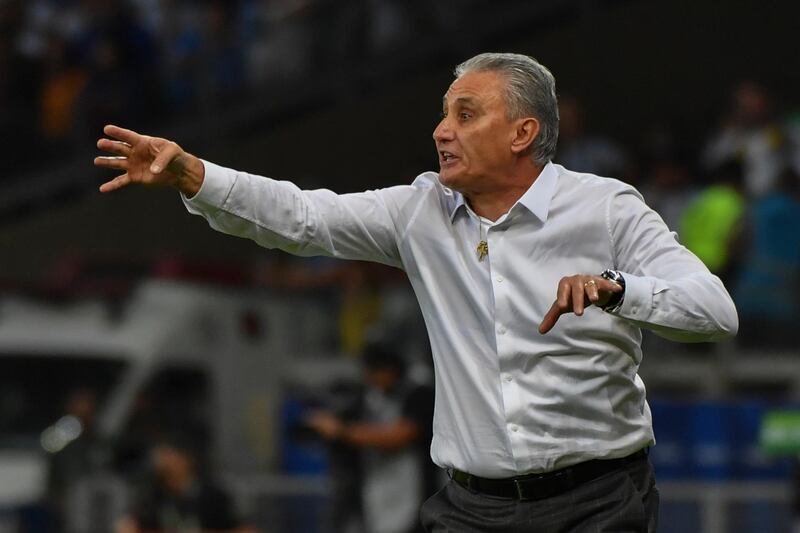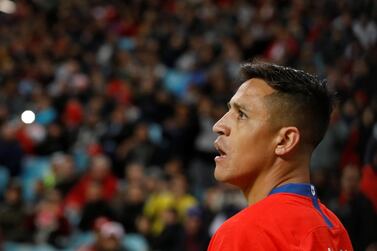Every Brazil manager who goes to a World Cup and leaves it without the trophy puts himself in heavy debt to his nation. Usually, he is given no chance to repay, merely an abrupt farewell and, only if he is very lucky, he might asked to come back later and have another go.
Tite, as Adenor Leonardo Bacchi is best known, broke that mould by surviving a quarter-final exit in Russia 12 months ago. On Sunday evening, in the Copa America final, the Brazil manager has a chance to reduce his owings to the most expectant and demanding of constituencies.
Meanwhile, any man who sabotages a country’s chances of reaching a World Cup tournament with as cruel a stab to the heart as a very late goal would not expect to be invited anywhere near that country’s hopes ever again.
Yet such is the unusual, circular storyline that has turned Ricardo Gareca more than once into one of the most important shapers of Peru’s sporting history, their manager now stands 90 minutes from an astonishing underdog triumph.
Esta é a bola da grande final da @CONMEBOL #CopaAmerica Brasil 2019.
— Copa América (@CopaAmerica) July 5, 2019
🔥 https://t.co/btQxM0UAI9 ⚽ pic.twitter.com/cgY5dQ3xNx
Tite and Gareca cut distinctive figures on the touchline, the one sturdy, close-cropped and with a martial bearing, the other long-haired, lean and with a weathered face.
Gareca, the latter, was a fine striker in his heyday as a player, an Argentine privileged to have been a club and international colleague of Diego Maradona. And to this day Maradona still thanks Gareca for the most important goal Gareca ever scored: He was called off the substitutes bench to join Maradona for a frantic last half hour of the last qualifying fixture for the 1986 World Cup.
Argentina, at home, were losing 2-1 to Peru, which meant the Peruvians and not Maradona’s team would be heading to Mexico the following summer. Gareca, prodding the ball over the goal-line with less than 10 minutes remaining, altered the equation.
Argentina, with no Gareca in their squad, went on to win that World Cup.
O Parque do Ibirapuera, uma das atrações turísticas que você não pode perder em sua visita a São Paulo. #VibraOContinente com a #CopaAmerica Brasil 2019.
— Copa América (@CopaAmerica) July 4, 2019
🎉🏆⚽ pic.twitter.com/6uPaxiztum
Meanwhile, Peru would wait another 32 years before they made it to any World Cup at all. Since the manager who took them to Russia last year has now also led them to a first Copa America final since 1975, Gareca is fully forgiven for that fateful goal in the mid-1980s.
He may have authored Peru's downfall then; he has masterminded a revival so convincingly that a generation of supporters barely register now that he is not Peruvian. Indeed, his Argentine background seems relevant only as an omen.
The last two winning managers in the Copa America final, in 2015 and 2016, have both been Argentina-born expatriates, Jorge Sampaoli and Juan Antonio Pizzi, who were in charge of Chile’s double champions.
Gareca took the Peru job in early 2015. That summer, they reached the semi-finals of the Copa, a significant milestone in itself. Since then, Gareca’s talent has been to blend the national instinct for creative, adventurous football and with a tenacity that had seemed abandoned.

He has also built a team that can, it seems, deal with setback and the absence of senior players: Jefferson Farfan, the experienced, much-travelled winger, was ruled out of most of this Copa with a knee injury.
His teammates still beat Chile 3-0 in the semi-final. Captain Paolo Guerrero played no football between August and April because of a doping ban (the player maintains he ingested cocaine mistakenly, in a South American tea). Guerrero has returned, 35 years young, to the national team to contribute important goals in the campaign.
Meanwhile Tite, formerly manager at Al Ain and Al Wahda, negotiated Brazil’s progress to the final smoothly. He overcame the tensions of a penalty shoot-out against Paraguay and periods of pressure against Argentina in their semi-final.
He also coped so well without his highest-profile player - Neymar having withdrawn with injury shortly before the tournament began - that it might almost be viewed as a blessing: without Neymar there has perhaps been more space for Gabriel Jesus and Roberto Firmino to develop an understanding.
There has been no shortage of leaders, either, in Tite’s troupe. How much of a signpost this tournament might be for Brazil’s 2022 World Cup prospects is a matter of debate: His back four through most of the campaign has included at least three men well into their 30s. Still, the veterans Thiago Silva, Miranda, Felipe Luis and 36-year-old Dani Alves have served Tite well. Brazil are yet to concede a goal.
Against Peru in the last match of their group, they scored five. Granted, Peru sensed strongly their progress to the knockout stage was safe by then. But it was still a heavy loss, clearly disturbed Gareca, and it happened only two weeks ago.
Impressive though Gareca's Peruvian revival programme has been, that is a little too recent for comfort.







